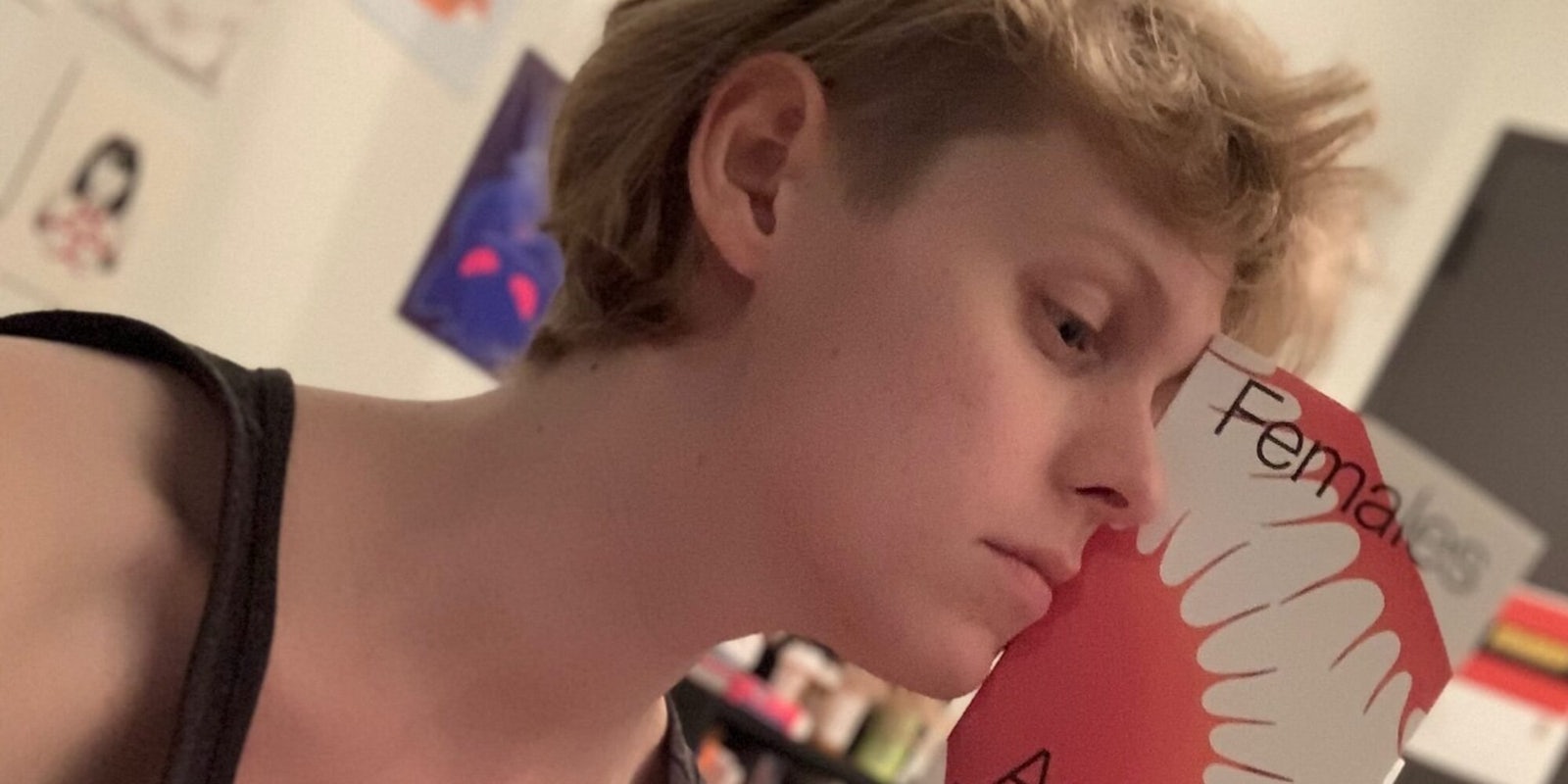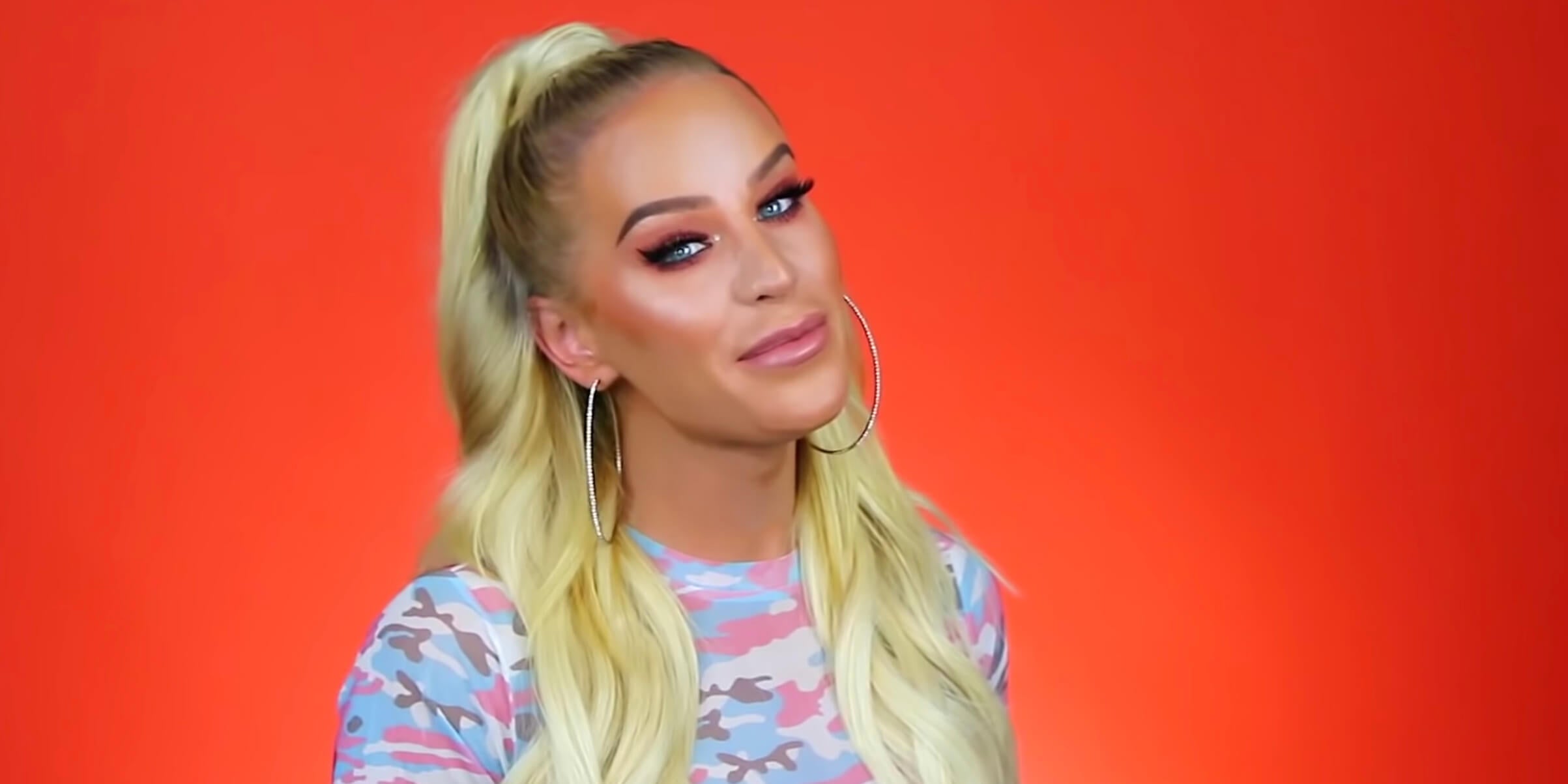Opinion
Trans/Sex is a column about trans peoples’ relationships with love, sex, and their bodies. Have a topic suggestion? Contact Ana Valens at avalens@dailydot.com or @acvalens on Twitter.
…
When I received my press copy of Andrea Long Chu’s Females, I was skeptical but excited. Chu’s “On Liking Women” is a personal favorite, whereas her New York Times op-ed “My New Vagina Won’t Make Me Happy,” not so much.
I eagerly sat down to read, only to find Chu comparing gender transitioning to a “canvas for someone else’s fantasy” and calling transgender lifestyle YouTuber Gigi Gorgeous “a dumb blonde.” By 38 pages in, Chu declares that understanding your own gender identity is merely subjective and is “on its own basically worthless.”
“Gender is something other people have to give you,” Chu claims. “Gender exists, if it is to exist at all, only in the structural generosity of strangers. When people today say that a given gender is ‘valid,’ this is true, but only tautologically so. […] The truth is, you are not the central transit hub for meaning about yourself, and you probably don’t even have a right to be.”
When I shared excerpts of Females on Twitter, it immediately sparked controversy. Other trans Twitter users, long disillusioned with Chu’s writing, found little to enjoy.
https://twitter.com/acvalens/status/1190410382927634432
Chu’s book is framed by her muse Valerie Solanas, the radical feminist who wrote a manifesto calling for the annihilation of “the male sex.” Chu’s Females and Solanas’ “SCUM Manifesto” are both authors’ ways of telling a joke. But the joke in the “SCUM Manifesto” is on men. The joke in Females is on trans women—and it’s a very mean, boring joke.
…
Chu asserts that “everyone is female, and everyone hates it.” “If this is true,” she writes, “then gender is very simply the form this self-loathing takes in any given place.”
“Female,” in this case, isn’t about being a certain gender, sex, or gender expression. Chu says to be female is to “let someone else do your desiring for you, at your own expense […] its ultimate toll, at least in every case heretofore recorded, is death.” Being female is an existential condition of human existence, one we all experience, because, as Chu argues, “all gender is internalized misogyny.”
“Gender is not just the misogynistic expectations a female internalizes but also the process of internalizing itself, the self’s gentle suicide in the name of someone else’s desires, someone else’s narcissism,” she says.
What Chu is touching on here is gender as codependency. According to one well-known model, Stephen Karpman’s Drama Triangle, all codependent relationships take place within a triangle. Everyone in the triangle plays a role: victim, rescuer, or persecutor. The triangle is not done to us. We seek it out, create it, and purposefully maintain it, whether we’re aware or not. And all three roles are played in an infinite cycle, so everyone persecutes, rescues, and becomes a victim.
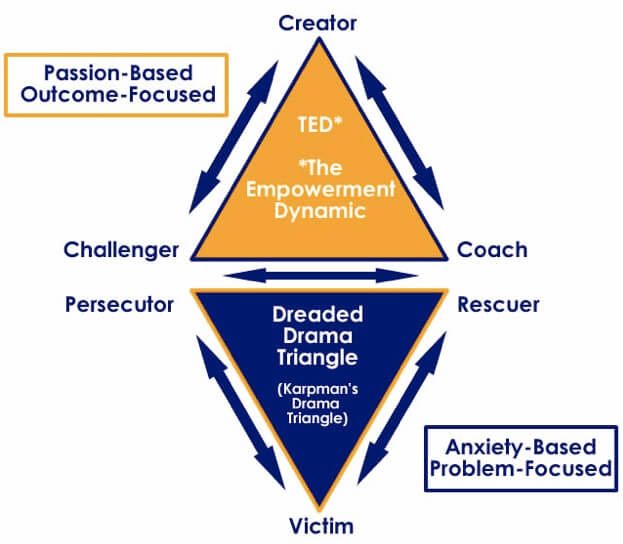
Chu argues that being “female” is an existential experience of doing gender, but what she’s actually describing is codependency on a macro level: She insists people do gender because everyone, to some degree in their lives, feels the need for validation in a society that places so much importance on being perceived as one’s gender. Remember, Chu says gender is something given to you; in her eyes, gender is at best assigned, at worst only as real as other people think it is. Taking Chu’s theory to its logical conclusion, that means gender is something done to us, it’s something we do to other people, and it’s something we use to ignore our own gender anxieties and focus on someone else’s. In other words, Chu thinks gender isn’t so much real as it is just projection in action.
Chu operates from the assumption that all trans women were assigned as men and came to view themselves as women because they were, in so many words, sissified. But if her point is true, then transitioning genders would be pointless. Conversion therapy, not gender transitioning, would cure gender dysphoria by helping people cope with and resolve their dysphoria.
Yet as one September study found, conversion therapy actually doubled trans peoples’ attempted suicide risk. Those who experienced it before 10-years-old had their risk quadrupled. Meanwhile, according to Cornell University, “scholarly literature makes clear that gender transition is effective in treating gender dysphoria and can significantly improve the well-being of transgender individuals.” There is only one way to actually help someone deal with dysphoria: help them transition. That involves someone realizing they are trans.
In Females, Chu says YouTuber Gigi Gorgeous “sanded her personality down to the bare essentials.” She merely “laughs at what is funny, she cries at what is sad, and she is miraculously free of serious opinions.” This, Chu argues, is the ideal: Gorgeous has been sissified. “You cannot be gorgeous without someone to be gorgeous for.”
Chu isn’t the only one arguing this point. In one of her most controversial videos for Contrapoints, “The Aesthetic,” YouTuber Natalie Wynn suggests that womanhood is ultimately defined and validated to the extent that other people perceive your womanhood. Otherwise, you are not fully experiencing womanhood. You are merely feeling it, and oppression goes beyond feelings. It comes down to material conditions. Again, gender is something done to you, and is only as valid as other people treat you.
I’m reminded of two tweets that ultimately turned me off to Chu’s work: her thoughts on male privilege and cis normativity. This one from November 2018 is a real headscratcher. “See this is the dirty little secret,” she wrote. “If cis womanhood were not the gold standard, then trans women *would not even exist.*”
see this is the dirty little secret: if cis womanhood were not the gold standard, then trans women *would not even exist* https://t.co/VSsIrG8dQT
— wife of the mind (@andrealongchu) November 14, 2018
And then there’s her other classic hot take: “OF COURSE trans women experience male privilege before transition are you out of your entire mind.” This, Chu says, is “one of the weirdest lies we tell ourselves as a community that loves to tell itself weird lies.”
i have to say this is one of the weirdest lies we tell ourselves as a community that loves to tell itself weird lies
— wife of the mind (@andrealongchu) November 14, 2018
Both of these arguments assume cis womanhood is the default form of womanhood and that it is irrelevant whether trans people experience gender-related trauma before transitioning because society gives pre-transition trans women advantages. But if we treat cis women as just other women who exist in relation to trans women, nonbinary women, and other non-cisgender women, then this whole entire argument falls apart. All that’s left is the idea that your self-image isn’t as important as other people think, which is just plain old insecurity.
Wynn and Chu imply trans women face oppression and experience embodied womanhood only so much as others perceive them to be women, i.e., meeting society’s image of a cis woman. Applying this idea to queer sexuality means that if a closeted woman is gay but everyone thinks she’s straight, she navigates the world as a straight girl. She is not gay until she declares herself gay.
Do gay women experience straight privilege before they come out? Uh, no. Heteronormativity is something done to gay women, not sexuality. Being forced to stay in the closet is a form of oppression. It causes severe trauma that impacts queer folks before, during, and after their coming out. It’s also what trans people go through when they experience gender dysphoria and/or aren’t allowed to self-actualize.
But for some reason, Chu doesn’t give trans people the same level of self-understanding. She says, “You are not the central transit hub for meaning about yourself, and you probably don’t even have a right to be.” If others are “the central transit hub for meaning about yourself,” then whatever other people say must be real. Wynn and Chu both deny trans people the ability to define themselves because it runs the risk of shattering the very cis norms they look up to. And relying on cisnormativity to tell you who you are is just codependency.
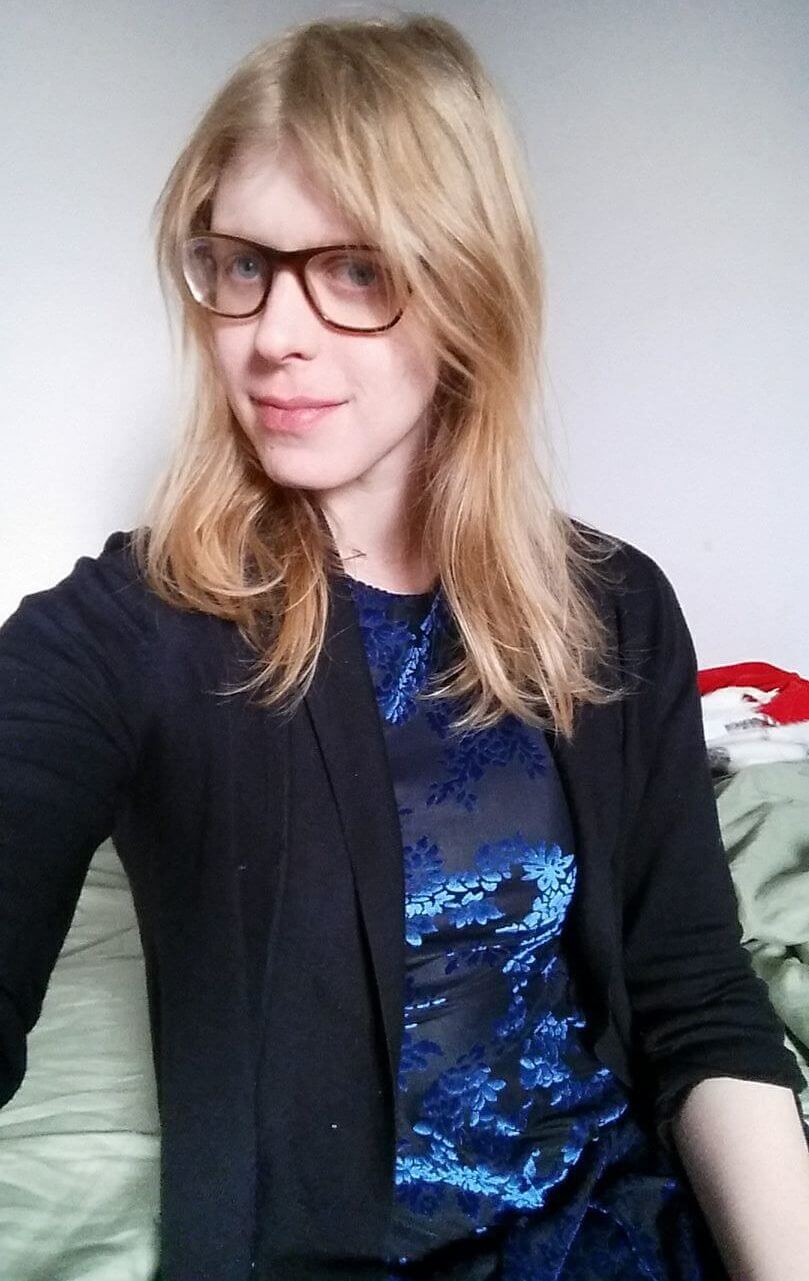
My gender identity can best be described in one word: insecurity. I was insecure before I transitioned, and I’m still insecure now. But insecurity isn’t a binary.
Early in my transition, I went out of my way to “appear like a woman” so I could pass. I had long blonde hair, dresses, and tight shirts with low v-necks. I wore push-up bras every day and hid my forehead as much as possible. I even tried wearing makeup. Most of all, I tucked religiously and obsessed over whether others could see my junk as I walked down the street.
During my early transition, I passed, I fit in, and people perceived me as “a cis woman.” But I didn’t want to exist in society as a cis woman. I wanted to exist as myself. I was engaging in a form of gender expression to meet others’ expectations, not my own, and it just wasn’t the real me.
So I stopped. I cut my hair short. I ditched my bras. I stopped tucking. I bought Timberlands and Vans. I began wearing baseball caps, tank tops, and plaid. I wore a BDSM necklace. The final transformation came when I got an undercut: first hidden, then impossible to hide. I did these things because I wanted to do it. It’s not about being happy or validated. It’s just about having the right to be myself as I choose, period.
That’s not to say aiming to pass as cis is inherently a bad thing. I still do pass, and I’m very privileged in that regard. But there is a difference between passing as a way to assure one’s safety and purposefully regurgitating cissexism to appease cis people. For example, I will never undergo bottom surgery just because cis women want me to do it. I would only undergo bottom surgery if I wanted a vagina. And as of now, I don’t.
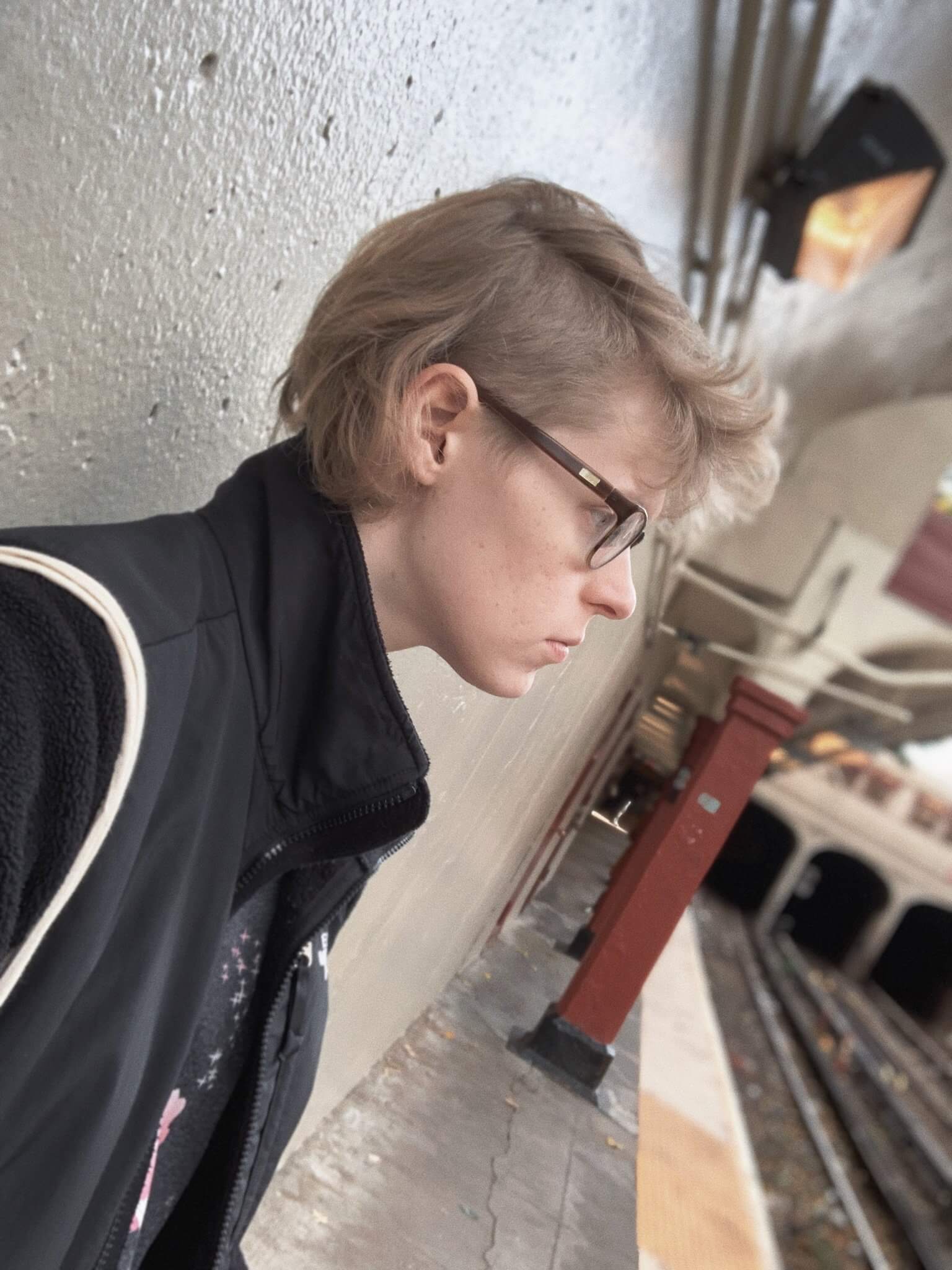
The truth is, cis people have a lot of ideas about gender that just don’t add up. This is a common problem of the privileged: they’re morons. Many white people have stupid ideas about race. Many straight people have dumb ideas about sex. Many civilians don’t know jackshit about doing sex work. Hegemony isn’t true, it’s just popular.
Sadly, the marginalized feel a lot of pressure to squeeze themselves into these hegemonies to survive. This is what “the self’s gentle suicide” actually is: selling yourself out for approval. The system is rigged against trans women and benefits cis people, and it’s not sustainable without resentment. You will never see yourself as a woman if you play by someone else’s definition.
Verso Books’ website praises Chu as a “thrilling new voice” who has launched “the ‘second wave’ of trans studies.” But Females doesn’t care what trans people think. We’re the punchline, and here’s the joke: Trans women are hysterical loonies that lie to each other to feel better about being trans women. With a wink and a nudge, Females promises to fill cis readers in on all the hilarity. Chu isn’t the first trans woman to make the joke, and she won’t be the last.
A “bit,” Chu says, is funny because the comic isn’t laughing. But what if the target of the joke isn’t either? What if we don’t need to be validated by others every single day to feel real? What if we have our own, unique ideas about what gender should be? And what if we make cis people meet us where we are, and not vice-versa? To ask that is to call out Chu’s book for what it is: a bad joke. And there’s nothing worse than a comic defeated by a good heckler.
READ MORE:
- Porn has a trans representation problem
- From orgasms to dysphoria, the truth about vaginoplasty
- Trans/Sex: What it’s like using erectile dysfunction medication as a trans woman
